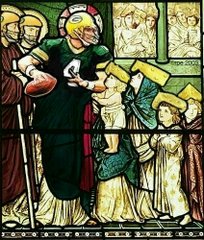Jesus answered and said to her, "If you knew the gift of God, and who it is who says to you, 'Give Me a drink,' you would have asked Him, and He would have given you living water."
Jesus answered and said to her, "Whoever drinks of this water will thirst again, but whoever drinks of the water that I shall give him will never thirst. But the water that I shall give him will become in him a fountain of water springing up into everlasting life."
The woman said to Him, "Sir, give me this water, that I may not thirst, nor come here to draw."
Just as the One who spoke to the Samaritan woman at the well is the Messiah, the Christ of God, so too is the One who speaks to you

"I believe that when the called ministers of Christ deal with us by His divine command, in particular when they exclude openly unrepentant sinners from the Christian congregation and absolve those who repent of their sins and want to do better, this is just as valid and certain, even in heaven, as if Christ our dear Lord dealt with us Himself."
Now Luther did not make this up as his own private interpretation in order to brow beat people into submitting to his own authority and personal agenda. It is what Jesus commissioned His apostles to do and what they in turn commissioned pastors to do as they took the good news of salvation, "Repent, the kingdom of heaven is at hand," into every nation and established church congregations as they went. To wit:
Matt 16:19 -- "And I will give you the keys of the kingdom of heaven, and whatever you bind on earth will be bound in heaven, and whatever you loose on earth will be loosed in heaven." (NKJ)
John 20:22-23 – And when He had said this, He breathed on them, and said to them, "Receive the Holy Spirit. If you forgive the sins of any, they are forgiven them; if you retain the sins of any, they are retained." (NKJ)
Thus, in the order of Individual Confession & Absolution on p. 293 of LSB, immediately prior to absolving the penitant, that is pronouncing the sure and certain forgiveness of sins to the one who has just confessed, the pastor asks, "Do you believe that my forgiveness is God’s forgiveness?" The penitant that then answers, "Yes," is told, "Let it be done for you as you believe," and then receives the absolute and certain benefit of having his sins forgiven right there on the spot, not strings attached.
The same is true for you every time you confess and are absolved in the liturgy of the Divine Service, which by the way leads to and finds it’s embodiment in the Lord’s supper as you feast with Christ and even receive his very body and blood by which you not only remember His death but participate in His resurrection.
So what does all this have to do with our text, that is the encounter and conversation between our Lord and the Samaritan woman at the well?
Well, . . . .
That encounter and conversation was in fact nothing if not a Law/Gospel sermon, perfectly preached by our Lord. This sermon is woven throughout the encounter, with a repetitive ebb and flow between revealing the woman's sinfulness and Jesus' forgiveness.
Now I am already well into the third page of today’s sermon (including the reading of the Gospel text), which tells me that there is not time to take you to and through every point of Law & every point of Gospel in the text – that is what our Bible studies are for. However *the* point of every instance of Law is to tell the Samaritan woman that there is no doubt that she is a sinner. And *the* point in every instance of the Gospel is to tell the same woman that the Son of God is there to forgive her. We’ll let one example of each suffice.
When Jesus said to her, "You have well said, 'I have no husband,' for you have had five husbands, and the one whom you now have is not your husband; in that you spoke truly." He is telling her that she is guilty of adultery. Now this is all the more stunning when He concludes their conversation by saying, "I who speak to you am He." In other words, he is telling her that though she is a poor miserable sinner, and everyone who knew about the Messiah as she did knew that the Messiah, that is Christ, as the Son of God could neither tolerate nor let sin live in His presence. His very coming was known to be for the purpose of purging sin from the world for the sake of His righteous ones.
So how could this be? There is no doubt the woman understood this man at the well was calling her a sinner, for when she went into the city she told the men there, "Come, see a Man who told me all things that I ever did. Could this be the Christ?" (John 4:29, NKJ) Now from our text and the limited time that Jesus had with her at the well it ought to be obvious that the woman was not trying to say that Jesus had just given her a complete minute by minute record of her life from infancy to the present. What the woman was telling the men was that a man who claimed to be the Son of God had revealed her unrighteous, sinful life to her. In saying that she had had five husbands and was now living with a man not her husband, Jesus was calling her a loose woman and an adulteress. Now you do realize in so doing that meant he was saying that she deserved to be stoned to death, right. And yet, there he was with her, the Son of God in the flesh speaking with her in a firm, no nonsense, yet still loving way. This sinner deserving of death and damnation had been encountered by God and lived to tell about it.
One is reminded of a conversation in which Jesus engaged with another woman of ill repute:
And Jesus said to her, "Neither do I condemn you; go and sin no more." (John 8:11)
 Every sermon, every liturgy of the Divine Service, every gathering of the Church tells you the very same thing as Jesus told the Samaritan woman at the well, and the adulteress set to be stoned – or at least it should. Because that is what our Lord has commanded and instituted them and His servants to do.
Every sermon, every liturgy of the Divine Service, every gathering of the Church tells you the very same thing as Jesus told the Samaritan woman at the well, and the adulteress set to be stoned – or at least it should. Because that is what our Lord has commanded and instituted them and His servants to do. It is not a popular message. It got the prophets stoned. It got our Lord crucified. It got every one of the Apostles except John put to death. But it is the only message of salvation. It is the only message of evangelism. It is the only message of stewardship. It is the only message of good works. It is the message that the Samaritan woman took into the city to tell the men.
And incidentally, in light of our scheduled meeting following the service today, every voters meeting is about making sure that sermon is delivered here at Trinity every Lord’s day in order to keep you with Christ in the one true faith. So that you and everyone who comes in contact with Trinity through your pastor (not just me, but whoever that pastor might be) knows, in the words of Jesus sermon to the Samaritan woman, "I who speak to you am He" – "the Messiah who is coming" – who already has come to forgive the sins of the whole world by dying on Calvary, who now comes today to forgive you and all who hear the Word and receive the Sacrament through the work of the Holy Spirit in His church, who will come again to deliver you and all believers from Adam to the last soul of these Latter Days in the resurrection of the Last Day to live with Him forever in the flesh with whom you now live but by faith in His Word of promise.
You --, and make no mistake about it, the pastor who speaks is included in and with that you – are just as guilty of adultery as that Samaritan woman, and that means you too deserve a death sentence of eternal damnation. And yet, once that has been made clear, our Lord is still here to tell you "I who speak to you am He." I have served your death sentence as the Son of Man and experienced your eternal damnation as the eternal Son of God. And I have risen victorious for you and stand here with you sinner – to forgive you all your sins and give you my eternal life – in the name of the Father and of the + Son, and of the Holy Spirit. Amen







No comments:
Post a Comment